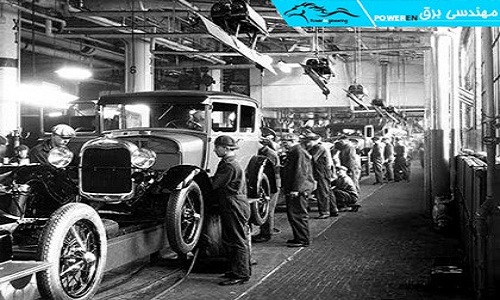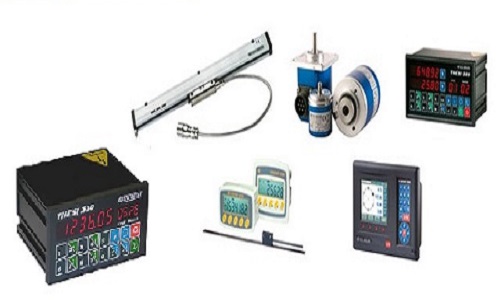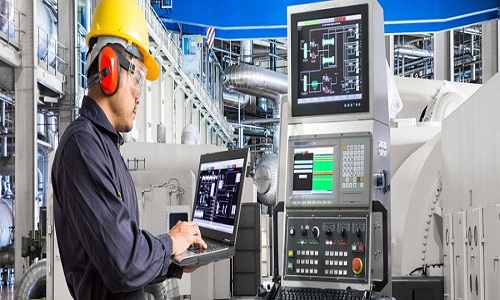industrial automation :
Automation is the connection of information components and different parts of an organization in the software platform, in order to transfer information and instructions, which accelerates the integration and adjustment of information and instructions to perform the appropriate action. Another name for automation is robotization.
It has many benefits, which we will discuss later.
:History of Industrial Automation and Automation Science
Until the early 1950s, factories used mechanized devices and tools along with manpower to advance their goals.
And due to the manual and non-automatic production systems at first glance, a limited number could have output and a lot of time was spent operating and people had to individually control the quality of output in factories and manually make the necessary changes in Equipment to apply Such equipment generally lacked flexibility and required considerable skilled labor to produce parts with acceptable dimensions and characteristics.
To improve productivity in systems, the most important factor is mechanization and automation and control of production equipment.
The mechanization of a machine is controlled by hydraulic or electronic mechanical tools and equipment, but in addition to this change, the workers were still directly involved in the work and the performance of the machine had to be checked alternately by them.
The event began with the mechanization of the textile industry and the construction of the first knitting machine in Britain. This event marked the first industrial revolution in the late eighteenth century.
After that, the second industrial revolution began. Henry Ford, the founder of the Ford Motor Company, used electricity in a mobile assembly line to mass-produce. After that, competition between industrial companies increased so that they could increase the quantity and quality of their products. Hence, companies were looking for a more economical and accurate solution.
With the construction of the world’s first programmable logic controller (PLC), the third industrial revolution, the automation revolution, took shape, and technology was transformed from electromechanical relays and analog control systems to digital and industrial automated systems. This period led to the development of equipment and increased productivity of industrial units.

Advantages of industrial automation:
- Reduce production costs
- Repeatability of activities
- Increasing the quality of manufactured products
- Increase speed and number in production
- More accurate and faster quality control
- Reduce production waste
- Increase safety for manpower
- Reduce operator costs
- Fix the problem of lack of specialized personnel
- Reduce the need for temporary warehouses
- Improved remote monitoring
Control components in an industrial automation system:
Automation consists of three basic parts, which are:
- Input measurement sensors
- Programmable Logic Controller
- Output actuator
Input measurement sensors:
In fact, they are the eyes of control systems, and by quantifying the process values, they inform the controller of the current situation, and finally, the controller sends the required command to the stimulus to control the process and reach the set point. Each measuring device consists of three basic components: Sensor, Transducer and Transmitter.
Programmable Logic Controller : Controllers are the precision instruments of the control department. Control is directing and maintaining one or more processes to a desired state or conditions. This concept includes quantitative, qualitative control, safety maintenance, which are the main goals of control.
actuators : actuators are components that can be selected from a combination of controls and act on these decisions. The main output devices can be control valves and electric motors

Products used in industrial automation:
Among the products used in industrial automation are:
- Programmable logic Controller (PLC)
- Human Machine Interface (HMI)
- Controller
- Relay
- Encoder
- Communication converters
- Power supply
- Limit Switch
- Data Logger
: Application of industrial automation
From a variety of control systems to the use of equipment such as machinery, factory production process and heating systems, the movement of ships and aircraft and so on.
: And the most important application of automation in the monitoring industry, which means collecting the desired information from different parts of an industrial unit and displaying them in the desired format for this purpose
- Display the current status of each machine and device
- Display and record important and vital parameters of a system
Display and record various statistics at system error times and……
: Top companies in the field of industrial automation
- Siemens
- ABB
- Rockwell Automation
- Schneider Electric
- Honeywell Process Solutions
- Mitsubishi Electric
- Yokogawa electric
- Emerson Process Management
- Danaher Industrial Ltd
- Omron Automation
The most famous brands in the field of system automation are Siemens, ABB and Rockwell.

